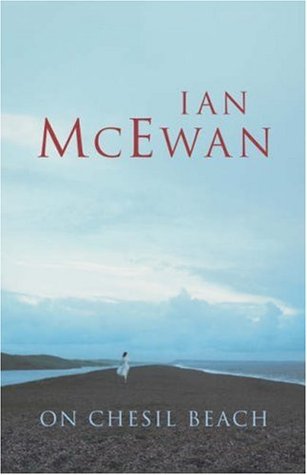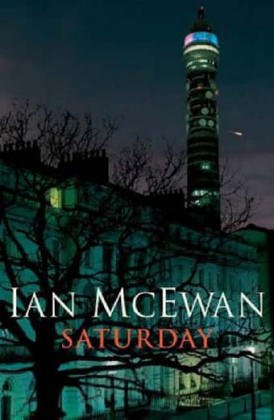While most of the Booker debate regarding Ian McEwan’s On Chesil Beach seems to be about its length and whether it qualifies as a novel, I say it doesn’t actually matter since, back in 1980, J.L. Carr’s A Month In The Country was much shorter yet made the shortlist. The other charge of course is that it’s an Amsterdam, an inferior novel being pushed to rewards while the better stuff goes unrecognised. Well I quite liked Amsterdam, so I was looking forward to On Chesil Beach. And it didn’t disappoint. Not entirely, anyway.
Florence and Edward are newlyweds – and virgins, this being 1962 when “a conversation about sexual difficulties was plainly impossible”. After their wedding they have taken themselves off to their honeymoon suite facing onto Chesil Beach. Here they have a meal they have little appetite for before moving to the bedroom to consummate their marriage. It’s this latter event that provides much of the novel’s (or is that novella’s?) tension, for while Edward has waited and waited to make love to his wife (“though his fear of failure was great, his eagerness – for rapture, for resolution – was far greater”), Florence has been dreading the day:
Florence suspected that there was something profoundly wrong with her, that she had always been different, and that at last she was about to be exposed. Her problem, she thought, was greater, deeper, than straightforward physical disgust; her whole being was in revolt against a prospect of entanglement and flesh; her composure and essential happiness were about to be violated. She simply did not want to be ‘entered’ or ‘penetrated’. Sex with Edward could not be the summation of her joy, but was the price she must pay for it.
The way in which McEwan tells the story of this couple works well, dipping between their thoughts and anxieties. One page has us seeing Edward’s happiness to have his new wife, yet worrying over whether, when they go to bed, he will, as the euphemism goes, “arrive too soon”. Then it’s a trip into Florence’s head as she gripes about how she dislikes kissing (and all other contact, really) and how she can’t be a good wife if she can’t even contemplate fulfilling what she believes are her duties as a wife. But, interspersed with these wedding day worries, are sections of pure exposition that head back into their lives prior to current events. Sure, it gives them a background, but it feels all so unnecessary, taking the reader out of the moment (which is truly interesting) and giving a family history lesson that we could do without.
Even where the structure is a let down, the prose remains a joy. McEwan’s choice of words demonstrates his particular talent at painting, with a few measured strokes, a whole scene. And when he gets into the mind of his characters he truly explores them to the point that we know that beyond the page their lives still go on. But On Chesil Beach does suffer by the time the end comes round. What had started as a slowly lapping wash of narrative becomes, in its closing pages, a tsunami of events flashing forward into the future, explaining the relationship.
Without the lengthy flashbacks explaining the newlyweds, On Chesil Beach would certainly be in novella country, and perhaps that’s where it should have stayed. The study of two people whose love for each other is frustrated by lack of communication is a wonderful tale to be told and here it’s done so well – the rest is just padding. It’s a strong narrative but McEwan-lite. Let’s hope he has something more substantial landing on our shores soon.


I agree. I thought this was a wonderful book — and I enjoyed reading it. But I had some reservations, mainly that it ended so abruptly, as if McEwan just couldn’t be arsed to write a full length novel and wanted to be done with the thing. As much as I enjoyed this book, I don’t think it’s Booker Prize winning material.
Great analogy about lapping waves and a tsunami. I am looking forward to this, but kind of dont want to get to the end, which seems to have disappointed so many people.
I do like McEwan, but seem to prefer the novels that dont get the prize acclaim. My favourites by him are ‘The Cement Garden’ and ‘Enduring Love’. I found ‘Amsterdam’ a bit dull.
I liken McEwan a bit to Banville. Both write beautifully but seem to scratch around to find a story they want to tell.
I’ve read a few McEwan and am yet to be impressed, but, although nothing in your review suggest as much, I get the feeling this, being shorter, will be less tedious and rambling than his former novels. Hopefully. It sounds a great read (but then I’m a pervert, I guess ;-)), but a little sad that the two have such a limited marital relationship (lack of communication).